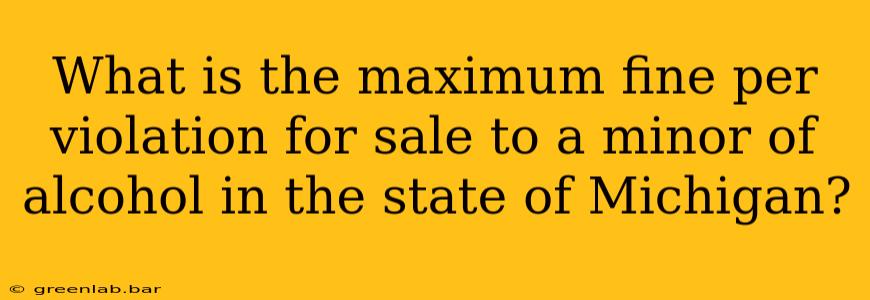Selling alcohol to a minor in Michigan is a serious offense with significant consequences. Understanding the penalties is crucial for businesses and individuals who handle alcohol sales. This guide will detail the maximum fine per violation, along with other important information.
What is the Maximum Fine?
The maximum fine for a first offense of selling alcohol to a minor in Michigan is $500. This is a significant penalty, and it's important to note that this is just the maximum. The actual fine imposed by the court can be lower, depending on the circumstances of the case and the judge's discretion.
Beyond the Fine: Other Penalties
It's vital to understand that the financial penalty is only one aspect of the consequences. Selling alcohol to a minor can lead to:
-
License Suspension or Revocation: The Michigan Liquor Control Commission (MLCC) has the power to suspend or revoke the liquor license of any establishment found guilty of selling alcohol to a minor. This can be devastating to a business, resulting in significant financial losses and potential closure.
-
Increased Insurance Premiums: Conviction for selling alcohol to a minor can lead to substantially higher insurance premiums, adding to the overall cost of the offense.
-
Civil Lawsuits: The victim (the minor or their parents) can file a civil lawsuit against the establishment or individual who sold the alcohol, seeking further financial compensation for damages.
-
Criminal Record: A conviction for selling alcohol to a minor is a criminal offense and will appear on the individual's or business's record.
Factors Affecting the Fine and Penalties:
Several factors influence the severity of the penalties imposed:
-
Prior Offenses: Repeat offenders face much harsher penalties, including significantly higher fines and more extensive license suspensions or revocations.
-
Circumstances of the Sale: The court will consider the circumstances surrounding the sale, such as whether the seller knowingly sold alcohol to a minor or took reasonable steps to verify the buyer's age. Presenting a fake ID might influence the severity of the punishment for both the seller and the underage buyer.
-
Judge's Discretion: Ultimately, the judge presiding over the case has considerable discretion in determining the appropriate fine and penalties.
Prevention is Key
The best way to avoid these significant penalties is to implement robust age verification procedures. This includes:
-
Thorough ID Checking: Always check identification carefully, looking for signs of falsification. Refuse service to anyone who cannot provide a valid, unexpired photo ID proving they are 21 or older.
-
Employee Training: Train employees on proper age verification procedures and the legal consequences of selling alcohol to minors. Regular refresher training is recommended.
-
Clear Signage: Post clear signage indicating the legal drinking age and the establishment's policy on serving minors.
-
Responsible Alcohol Service Practices: Implement responsible alcohol service practices, such as limiting the amount of alcohol served to a single individual.
Conclusion
Selling alcohol to a minor in Michigan carries severe consequences. The maximum fine is $500 per violation, but this is only the tip of the iceberg. License suspensions, increased insurance premiums, and potential lawsuits can lead to far greater financial losses and reputational damage. Proactive measures to prevent such violations are essential for businesses and individuals involved in alcohol sales. Always prioritize responsible alcohol service practices.
Disclaimer: This information is for educational purposes only and should not be considered legal advice. For specific legal advice, consult with a qualified attorney in the state of Michigan.

